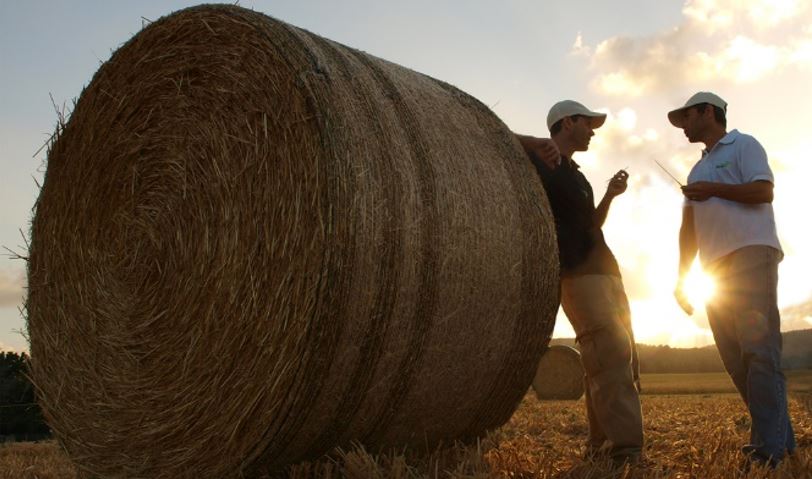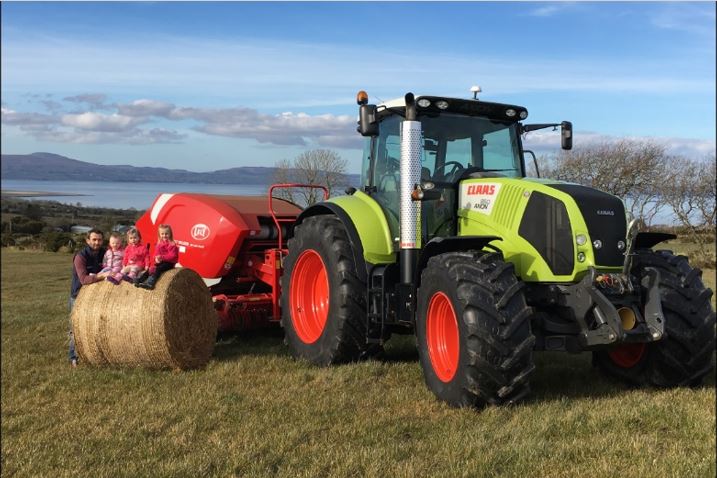For those of us that make bales, no matter whether it’s for ourselves or contract work for others, do we ever consider the parts of the process that come together to create the goal? The food value of the bale?
After all, it is easy to forget, the sole purpose of making round bales is either to feed an animal or give it a bed on which to lie.
It could be argued that this ‘process’ could include everything that is needed to make the bale, the baler, the tractor to pull it, even the fertiliser for the crop at the right time.
All are elements of the process of good bale making. Get one or more wrong and the finely balanced operation begins to lose its focus, bringing compromises to what will ultimately result in lower quality forage.
Of all the elements in this process, some may be seen as only temporary or a necessary commodity needed to do the job. After all what good is the baler, the tractor to pull it, the driver to manage it all, if there’s no netwrap in the baler?
Fundamental elements
The netwrap is one of the most fundamental elements of the operation, yet, ironically, its relatively low purchase price could confer on it less importance than it justly deserves. Buy it, use it, don’t think twice about, is often the attitude – yet this is so wrong.
The majority of round baling is done by contract-operated balers, which easily reach upwards of 10,000 bales per year, per baler; now think of how many bales will be made in the life-time of the baler?
The numbers begin to stack up. With a five-year replacement, that baler will easily have netwrap to the same value as the baler. Think of that, the same value of the baler spent on the “consumable commodity”.
A netwrap that gives poor cover will not make a good silage bale. The air trapped within the exposed shoulders compromise a good fermentation, delivering a bale that is below what it could have been in feed value.
You may know all of this or, perhaps, you are one of the professional users that fully understand the points. It is for this reason that such an important element of the process is close to the heart of the country’s leading netwrap supplier.
Tama ASSIST
Tama Group has pioneered the way in the business of highlighting and improving ways to increase forage value.
Far from just being a maker of netwrap and twine, Tama goes much deeper in trying to find a way to achieve what the farmer really needs from a silage bale, with a level of knowledge that no other producer can bring, as Tama employees farm themselves, have their own balers and their own dairy and beef herds.
Added to this, its close joint R&D co-operation with all the leading baler manufacturers, means it has a good understanding of what you need.
Furthermore, the company has a strong presence on helping the customer before, during and after using its products. Not just “here today – gone until next season”, Tama ASSIST is a part of Tama Group that is designed, as the name suggests, to give support where and when required.
This may be in understanding more about the products you need and what makes them more suited to your operation, to looking for help with an in-field hold-up. Tama has opened up its knowledge banks for you to take advantage of.
The very comprehensive on-line site contains information on all three product lines – netwrap, stretchfilm and twine – with countless gems of knowledge, insight and help.
Tama ASSIST also extends to troubleshooting and direct on-farm support, when required, from the fully trained regional technical team in Ireland led by Ray Fletcher. Contact Ray on: 087-9144244.
Try to re-consider the importance of the roll of Netwrap you purchase; think of the cost versus the value it can bring to your business.
Whether you are a farmer and want trouble-free baling, making exceptional bales, or a high-volume operator, where time saving and a good-job left behind is a must, knowing how much you can add to your bottom line by not throwing it away at the top.
Less downtime; greater productivity
“I had been using a standard 7,200ft twine in the past and tried the Tama 9,600ft when it first arrived on the market,” said Stephen Eustace, from Tullow, Co. Carlow.
After testing I immediately moved to using the 9,600ft all the time. I found that the twine ran a lot better through the knotters and knots pulled tighter quicker so there were no more slipped knots.
“Even when joining the twine in the twine box the twine knotted better and there were no longer any problems with knots opening due to vibrations.
“Also, the benefits of having longer spools means that I have to carry less twine which results in less downtime loading twine.”
Tommy Whiteside of Whiteside Agri Contracts in Greysteel, Co. Derry, is a large contractor who has been using TamaNet+ 3600 for many years and is looking forward to 2020 with Tama netting.
Tommy has grown with Tama through the years and now sees the benefits of Tama’s consistency and reliability with increased quality and strength.
“Tama netting has given me the peace of mind that allows me to continue with trouble-free baling and produce the same consistently perfect bales each time. It is hassle free and maintains a tight and well packed bale in all weather conditions,” said Tommy.
“At present, I am using Tama Edge to Edge 3,600m which is excellent; it leads to less downtime and greater productivity.”
‘Thing of the past’
Neilus O’Connor lives in North Kerry and has been using Tama net for the past 10 seasons.
“In the past, I used cheaper nets which resulted in a lot of downtime with a mix of problems. Since switching to Tama Edge to Edge problems of burst bales and net not spreading is a thing of the past,” said Neilus.
“Tama has been proactive with its support and in developing a quality product for Irish conditions.”
In 2015, Neilus was delighted to have the opportunity to use the Pink Tama Edge to Edge in support of Breast Cancer Ireland.
“This is a positive step in the fight against breast cancer. Breast cancer has affected the lives of so many families and we are delighted to support this fundraising campaign in conjunction with Tama.”
Additional information
To find out further information on Tama and its product range, go online or simple click here




